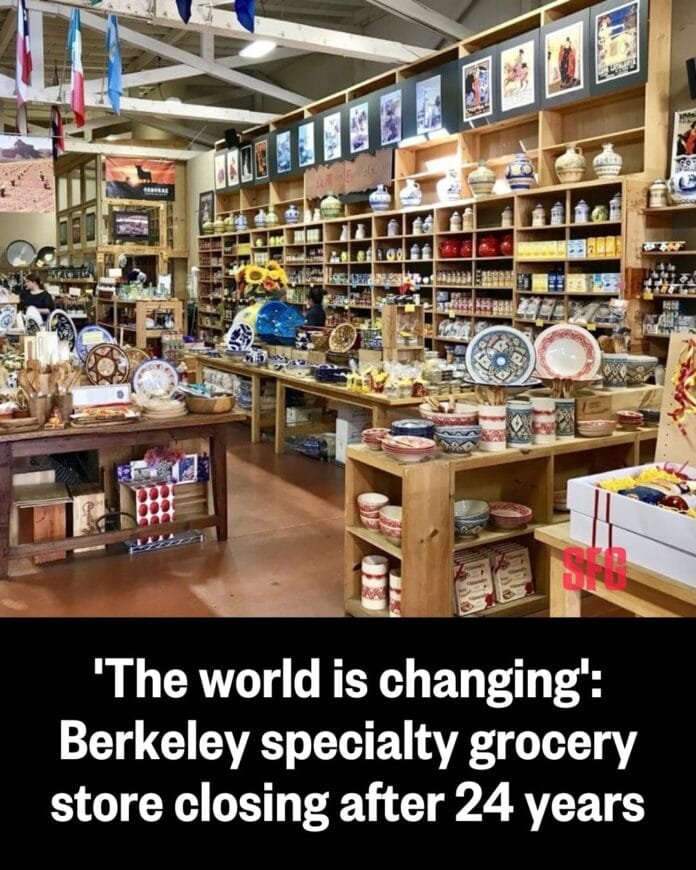For 24 years, The Spanish Table on San Pablo Avenue was a fixture for Bay Area cooks seeking Iberian ingredients—jamón ibérico, marcona almonds, and paella pans that once required a dedicated trip. On Aug. 17, 2025, it shut its doors for good, leaving customers mourning the loss of a cultural anchor in the Berkeley specialty grocery store scene.
“This wasn’t an emotional decision—it was about viability,” owner Bastian Schoell said. Tariffs, a weaker dollar, rising labor costs and rents, and eroding product exclusivity made the Berkeley location untenable.
Tariffs, Currency Strain, and the Economics of a Berkeley Specialty Grocery Store
A 15 percent U.S. tariff on European imports, imposed under the Trump administration, remains in place. For The Spanish Table, that meant landed costs roughly 35 percent higher on core goods. Duties are collected on arrival, tying up cash and complicating inventory planning.
For many independent specialty grocers in California, these tariff policies can mean the difference between breaking even and operating at a loss. A weaker dollar against the euro added further pressure, making imported staples more expensive for Berkeley shoppers and less profitable for the store.
From Scarcity to Ubiquity in the Bay Area Grocery Market
When the store opened in 2001, many of its SKUs were unavailable in mainstream retail. By 2025, Amazon, Costco, and major grocers carried similar products at lower prices and with wider reach. The store’s competitive advantage—scarcity—was gone.
Specialty grocery retailers in Berkeley now face direct competition from e-commerce and national chains, forcing them to rethink pricing, sourcing, and their unique value propositions.
Pandemic Whiplash and Consumer Spending Shifts
Lockdowns briefly boosted sales as more people cooked at home. Schoell anticipated sustained demand, but revenue returned to pre-pandemic levels once restaurants reopened. Overhead stayed high, and fixed costs offered no relief.
The trend reflects a broader pattern in specialty grocery retail: pandemic-driven spikes in home cooking were temporary, leaving many small grocers with inflated expectations and unadjusted operating models.
High Costs in Berkeley’s Specialty Food Retail Sector
California’s minimum wage and Berkeley’s commercial rents have climbed steadily. Insurance, utilities, and staffing costs locked in a high cost base. Post-pandemic shoppers, more price-sensitive, were less willing to pay the premiums needed to maintain profitability for a small specialty grocery store.
Experiential Retail Gap in Berkeley Specialty Markets
Specialty grocers increasingly rely on tastings, classes, and in-store dining to drive traffic. The Berkeley site lacked the infrastructure for such offerings, and retrofitting was estimated at more than $200,000. Schoell’s San Francisco store, by contrast, already runs a sandwich counter and is adding a wine bar.
Without an experiential hook, even the best specialty grocery stores in Berkeley risk losing foot traffic to competitors who provide events, tastings, and interactive retail experiences.
Strategic Refocus to Survive Specialty Grocery Challenges
Schoell is consolidating operations into the San Francisco café-retail hybrid, expanding e-commerce, and partnering with Berkeley’s Evergreen Café for pop-ups and limited offerings. The shift trims costs and preserves brand presence in the East Bay specialty food scene.
Retail Lessons for Berkeley Specialty Grocery Store Owners
The Berkeley closure underscores broader challenges for small specialty retailers:
- Hedge against input-cost volatility.
- Differentiate through in-store experiences.
- Manage lease timelines against realistic demand forecasts.
- Diversify channels to avoid dependence on one location.
Industry Implications for Small Specialty Grocers
Small, single-location grocers remain most vulnerable to tariff shocks, inflation, and competition from larger chains with private-label capacity and diversified supply. Persistent cost pressures could test even mid-sized players in the Berkeley specialty grocery store market.
Community Farewell and Cultural Loss
Regulars took to social media to share memories. “Growing up you guys were where we always went to get the goods from the motherland,” one post read. A closing event with live flamenco will mark the store’s departure, underscoring the cultural role a specialty grocery store can play in a community.



